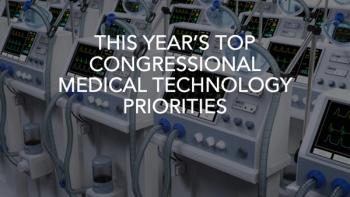
Despite advances in health care information exchange, the flow of data between large hospitals and small care facilities is anything but smooth and seamless.

Despite advances in health care information exchange, the flow of data between large hospitals and small care facilities is anything but smooth and seamless.

A Florida Atlantic University study paired high school students with older adults to improve tech literacy and health tracking.

President mentions some health care issues in address to Congress.

AdvaMed, the Advanced Medical Technology Association, the trade group for medical device manufacturers, released a list of priorities for Congress. Here are some of the key objectives.

Andrea Greco, SVP of healthcare safety at CENTEGIX, talks about keeping your practice safe — and how failing to do so can impact patient care.


‘The Cost of Neglect’ is growing, according to the third analysis of the state of primary care.

The transaction positions Wellvana as a leading value-based care enabler, extending services to approximately one million Medicare patients across 40 states.

Artificial intelligence platform can be used in ambulatory care practices.

Adopting a value-based approach to clinical, financial and administrative operations can help physician practices thrive in both FFS and VBC worlds.

Physicians, pharmacists and artificial intelligence can join to form a cost-effective solution that improves patient outcomes and financial sustainability.

Poor patient-clinician communication worsens care delays, especially for younger adults and racial minorities.

Study found a link between frequently missing school and suffering from more serious GI disorders

Outbreak spurs HHS guidance on potentially deadly disease.

Navigating student loan repayment as a doctor requires strategic tax planning — smart filing choices can lower payments, maximize forgiveness and enhance financial flexibility.

Andrea Greco, SVP of healthcare safety at CENTEGIX, shares the key factor in practice safety.


AI-powered recruiting is yielding benefits that include both accelerating and improving job-candidate matching.

President Trump says it’s necessary to impose extra costs on goods from Canada, Mexico and China. What does that mean for the health care sector? Potentially, a lot.

Johns Hopkins analysis suggests telehealth may contribute to disparities in mental health care access across economic groups.

Philips SmartSpeed Precise aims for faster scan times and improved diagnostic image quality across the company’s devices.

Primary care physicians have a chance to save lives through early detection of cancer.

A study, published in JACC Advances, highlights potential for early heart failure detection in primary care, thanks to AI.

U.S. Preventive Services Task Force taking nominations through mid-March for national panel of health care advisers.

What you need to know when selling a practice

Norman K. "Kip" Beals III, MD, joins the show to discuss the evolving landscape of health care reimbursement — and how physicians can weather the storm.

Andrea Greco, SVP of healthcare safety at CENTEGIX, explains what practices should keep in mind moving forward in regards to workplace safety.


What you need to know about selling a practice

Andrea Greco, SVP of healthcare safety at CENTEGIX, talks visitor management protocols to keep practices safe.